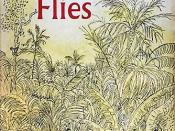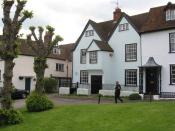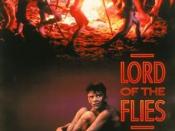The Lord of the Flies by William Golding is tale of a group of young boys who become stranded on a deserted island after their plane crashes. Intertwined in this classic novel are many themes, most that relate to the inherent evil that exists in all human beings and the malicious nature of mankind. In The Lord of the Flies, Golding shows the boys' gradual transformation from being civilized, well-mannered people to savage, ritualistic beasts.
From the time that the boys land on the island, both a power struggle and the first signs of the boys' evil, Piggy's mockery, occur. After blowing the conch and summoning all the boys to come for an assembly, an election is held.
"'I ought to be chief' , said Jack with simple arrogance, 'because I'm chapter chorister and head boy'"(page 22). This represents the beginning of civilization in all of the kids (which is changed later.)
After Ralph is Chief, Jack envies his position and constantly struggles for power with Ralph throughout the rest of the novel, convincing the rest of the boys to join his tribe rather than to stay with Ralph. Also, soon after the boys arrive at the island, Piggy, a weak character, is mocked by the other boys. After trying to recount all of the liluns' names, Piggy is told to "Shut up, Fatty," by Jack. Ralph remarks by saying, "He's not Fatty. His real name's Piggy." All of the boys on the island, except for Piggy, laugh and make themselves more comfortable at Piggy's expense.
"A storm of laughter arose and even the tiniest child joined in. For a moment the boys were a closed circuit of sympathy with Piggy outside"(page 21). That quote shows that they are starting to become uncivilized.
The boys become more comfortable with...


